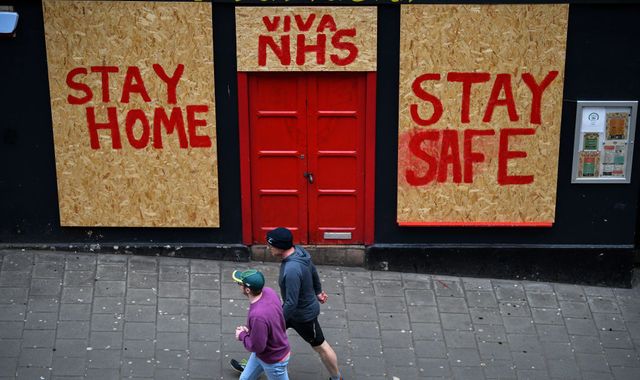Coronavirus: How Scotland is coping with life in lockdown
Written by News on 22/04/2020
They call him a schemie version of Freddie Mercury. – tough on a guy helping us through lockdown.


Mark Nelson, of big teeth and thick skin, is the stand-up comedian who fronts a new live-streamed comedy show – The Stand, Lockdown Edition.
To be fair, he invites the abuse – hashtag #hecklemark – and it’s a feature of the Saturday night webcast that amounts to showbiz survival.
Edinburgh’s The Stand comedy club – also available in Glasgow and Newcastle – is closed due to the lockdown and has been experimenting with the Saturday night live-stream from a flat on Edinburgh’s Southside.
The idea, so far, has been that viewers donate money to help keep club and comics afloat during the pandemic.
Live performance without access to a live audience is tough on the artists without the world’s biggest arts festival lined up. All Edinburgh’s main summer festivals have been cancelled, including the Edinburgh Fringe.
Mr Nelson told Sky News: “It is the most important thing we have, it’s like our Superbowl. Once one finishes you start thinking about the next one and then you start writing a show and then you’ve got two months of previews before it.
“So it is the culmination of a whole year’s worth of work. It’s a big deal for it not to be happening.”
As part of our Life In Lockdown series, Sky News spoke to a number of people around Scotland about the challenges they face.
Dr Catherine Brown is a GP based at Cromarty in the Scottish Highlands.
She believes in the benefits of musical therapy and regularly plays the violin for patients during home visits which, for now, are conducted only when considered necessary. Hitting the right note on a fiddle isn’t made any easier by wearing two pairs of protective gloves.
During her career, Dr Brown has worked around the world and has witnessed crisis response before. She was in Christchurch, New Zealand, when an earthquake struck there in 2011, and sees parallels between the human response then and now.
She told Sky News: “The parallels I would draw between then and now are that it’s mainly about people, coming together at a time like this, within the healthcare profession, outwith the healthcare profession and members of the community rallying together to help out in a real time of crisis.”
Crisis is a word laced through this year’s fund-raising effort at the Marie Curie Hospice Charity. Its annual Daffodil Appeal, which is used to raise £30m, has been rendered impossible because of social distancing.
The charity is now seeking emergency donations.
Libby Milton, lead nurse for the hospice in Edinburgh and West Lothian, told Sky News: “It costs us £2m a day to keep our charity going and we are supported by the British public.
“People remember us in their wills, people give us regular monthly amounts, but we also know that the big chunk of fundraising comes through mass public donations and March, when the daffodils start appearing, is when we traditionally will do our great daffodil appeal that keep us going through the year. This March has not been normal.”
The Marie Curie charity, which cares for terminal patients, have made a commitment to prevent the experience of so many casualties of the pandemic.
:: Listen to the Daily podcast on Apple Podcasts, Google Podcasts, Spotify, Spreaker
Staff facilitate one final visit for patients with close family, with appropriate COVID-19 precautions.
Libby Milton said: “We are still so mindful that if people are dying, the lasting memory of that for families is so critical that we are allowing that exceptional visit for the very last chapter, for the very end of life.”
“But getting the timing of that right is difficult. Symptoms are hard to manage but we really give it our best shot and, if we can give that comfort to families, then that makes a difference.
“Because, conversely, we know that if people aren’t there and can’t see and it’s their imagination, then that’s when they start being tortured by it in the weeks and months and sometimes even years to come.”
(c) Sky News 2020: Coronavirus: How Scotland is coping with life in lockdown







